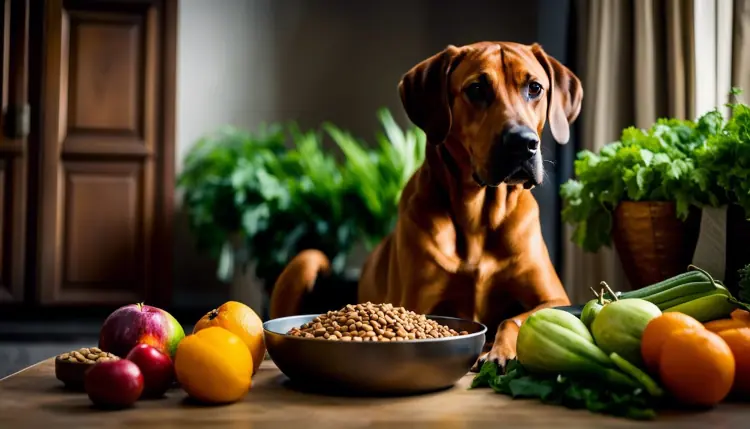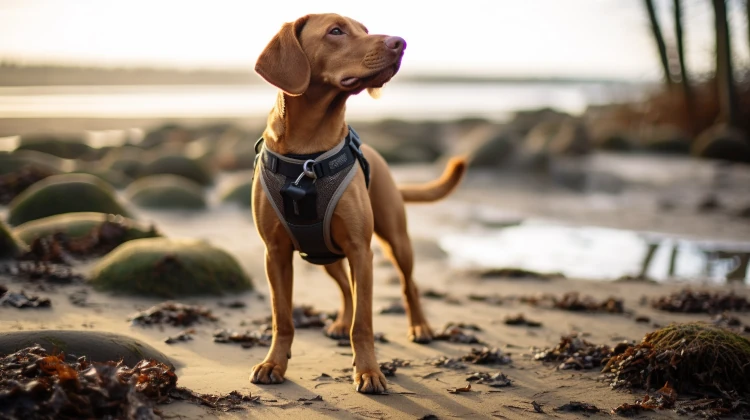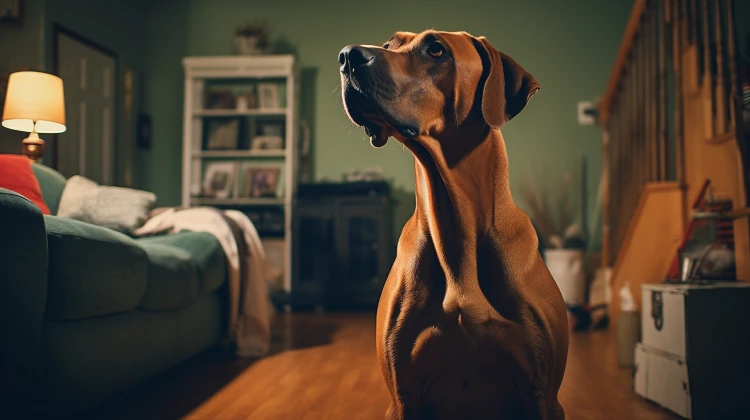Does feeding your Rhodesian Ridgeback often feel like a culinary puzzle? Trust me; I’ve been there. With their unique dietary needs, such as good-quality animal protein and Omega-3 fatty acids to reduce inflammation, it’s challenging to know the best route for their nutrition.
This article will unravel the mystery behind optimal diet and nutrition for your beloved Rhodesian Ridgebacks from puppyhood to adulthood. Stay tuned – better health for your pet is just a few scrolls away!
Table of contents
Key Takeaways
- Rhodesian Ridgebacks require a balanced diet of high-quality animal-based protein and Omega-3 fatty acids to support muscle development, maintain body tissues, and promote a healthy coat.
- Feeding amounts for Rhodesian Ridgebacks should be adjusted based on factors such as age, weight, activity level, and health status.
- Puppy food options should be designed for large dog breeds..
- Adult dog food options should prioritize high-quality animal-based protein sources.
- Senior dog food options should have lower calories, fat, and protein levels to prevent weight gain and reduce strain on joints.
- Including Omega-3 and Omega 6 fatty acids in their diet helps maintain a healthy coat by reducing inflammation and improving conditions such as arthritis.
Rhodesian Ridgeback Feeding Guide

To properly feed your Rhodesian Ridgeback, it is important to understand their nutritional requirements and determine the appropriate feeding amounts.
Nutritional requirements of a Rhodesian Ridgeback
As a lover of Rhodesian Ridgebacks, I understand how unique these dogs are. They’re distinct with their ridge of hair running along their backs and in terms of nutritional requirements.
A balanced diet for a Rhodesian Ridgeback should consist of high-quality animal-based protein that supports muscle development and maintains body tissues. They need sufficient amounts of Omega-3 and Omega-6 fatty acids to maintain a healthy coat and reduce inflammation, which can be obtained from fresh foods like The Farmer’s Dog products.
Plus, there’s the issue of their sensitive stomachs that needs special dietary consideration.
Feeding them homemade raw food made up of 60% raw meaty bones and 15-20% raw leafy green and yellow vegetables pureed using a blender is an excellent option, as well as a biologically appropriate raw food diet (BARF) consisting of roughly 80% meat, 10% edible bone, and 10% organ meats.
They require around 1325 to 1529 calories daily, given an adult Ridgeback typically weighs between 71 and 86 pounds. But remember! It’s crucial to adjust the portion sizes based on age, activity level, and metabolism rate, among other factors like health status, because one size doesn’t fit all when feeding your cherished furry friend!
Rhodesian Ridgeback feeding amounts
Determining the appropriate feeding amount for your Rhodesian Ridgeback can be tricky and highly depends on their age, weight, and activity level. On average, an adult Ridgeback that typically weighs between 71 and 86 pounds will need around 1325 to 1529 calories daily.
Now if you have a Rhodesian Ridgeback puppy, don’t overfeed them with puppy food formulas, as they tend to be too high in protein and calcium for our breed.
Remember that homemade raw food or biologically appropriate raw food diet (BARF) are excellent options for Rhodesian Ridgebacks’ diets. These consist of approximately 60% raw meaty bones and about 15-20% raw leafy green/yellow vegetables, pureed in a blender or, alternatively, a BARF, which is made up of almost 80% meat, with the rest being edible bone and organ meats.
Remember, every dog, including our beloved ridgebacks, is unique; some may eat less due to lower energy levels, while others may need more because they’re always on the go!
Different feeding approaches (homemade raw food, pre-packaged raw food, dried food, canned wet food)
Feeding your Rhodesian Ridgeback can be approached in many ways depending on their needs and your lifestyle. The homemade raw food diet, often called a biologically appropriate raw food (BARF) diet, is popular among many dog owners for its health benefits.
It typically comprises 80% meat, 10% edible bone, and 10% organ meats. You can also add raw leafy greens and yellow vegetables for nutrition.
Pre-packaged raw food is another convenient option that offers the same benefits and saves time spent on meal preparation. Dried or kibble foods are quite common due to their convenience and shelf life longevity.
They provide comprehensive nutrition but may lack freshness compared to other methods.
Canned wet food usually has a high water content that promotes hydration while providing tasty meals that most dogs love. However, some canned foods may contain fillers with little nutritional value, so they should be chosen wisely.
Lastly, as our adorable Rhodesian Ridgebacks may have sensitive stomachs, special consideration might need to go into choosing their diet – ensuring they receive all necessary nutrients without upsetting their bellies.
Best Food Options for Rhodesian Ridgebacks

When it comes to choosing the best food options for Rhodesian Ridgebacks, it is important to consider their specific needs at different life stages. From puppy food options to adult dog and senior dog food choices, providing high-quality animal-based protein is crucial for their overall health and well-being.
Puppy food options
For Rhodesian Ridgeback puppies, it’s important to provide them with the right nutrition for their growing bodies. Puppy food formulas can sometimes be too high in protein and calcium for these large breed dogs.
Instead, opt for puppy food designed specifically for large dog breeds, which will ensure they get the right balance of nutrients without overdoing it. Look for optimized calcium, phosphorus, and vitamin D options to support healthy bone development.
Homemade raw food diets can also be suitable if done correctly, consisting of 60% raw meaty bones and 15-20% raw leafy green and yellow vegetables. Always consult your veterinarian to determine the best feeding approach for your Rhodesian Ridgeback puppy.
Adult dog food options
As an adult Rhodesian Ridgeback, it’s important to have a well-balanced and nutritious diet. When choosing dog food for adult Ridgebacks, remember they need high-quality animal-based protein to support their muscle maintenance and energy needs.
Look for dog foods that list real meat as the first ingredient, such as chicken or beef. These proteins are easier to digest and absorb the essential nutrients to stay healthy.
Another important factor to consider is Omega-3 fatty acids, which can help keep their coat shiny and reduce inflammation in conditions like arthritis. Look for dog foods that contain ingredients like fish or flaxseed, as these contain Omega-3s.
It’s also great if the food includes antioxidants from fruits and vegetables to support our overall immune health.
Senior dog food options
As our Rhodesian Ridgebacks age, their nutritional needs change. It’s important to provide them with senior dog food options that cater to their specific requirements. Senior dog foods are formulated to support their aging bodies and promote overall health and well-being.
These options typically contain lower calories, fat, and protein levels to prevent weight gain and reduce strain on the joints. Additionally, they often incorporate ingredients specifically chosen for joint health, such as glucosamine and chondroitin sulfate.
Omega-3 fatty acids found in senior dog foods can help improve cognitive function and reduce inflammation associated with arthritis. When selecting a senior dog food for your Rhodesian Ridgeback, look for high-quality animal-based protein sources like chicken or fish to ensure they receive the necessary nutrients while maintaining muscle mass and supporting a healthy coat.
Importance of high-quality animal-based protein
Feeding your Rhodesian Ridgeback high-quality animal-based protein is crucial for their health and well-being. This type of protein contains essential amino acids necessary for muscle development, repair, and maintenance.
It also provides energy for daily activities and supports a strong immune system. Additionally, high-quality animal-based protein helps promote a healthy coat and skin by providing the necessary nutrients like Omega-3 fatty acids.
These fatty acids reduce inflammation and improve conditions such as arthritis in Rhodesian Ridgebacks. Remember to choose dog food options that prioritize this type of protein to ensure your furry friend gets the best nutrition possible.
Considerations for Rhodesian Ridgeback Health
Include Omega-3 and Omega-6 fatty acids in your Rhodesian Ridgeback’s diet to promote a healthy coat and reduce the risk of skin issues.
Omega-3 and Omega-6 fatty acids for a healthy coat
One important consideration when it comes to the diet and nutrition of your Rhodesian Ridgeback is ensuring they have a healthy coat. Omega-3 and Omega-6 fatty acids are crucial in maintaining a shiny and lustrous coat for your furry friend.
These essential fatty acids promote skin health, help reduce inflammation and improve arthritis in Rhodesian Ridgebacks. Fresh food options like The Farmer’s Dog contain these beneficial fatty acids, providing the necessary nutrients to support a healthy coat for your beloved pet.
Incorporating foods rich in Omega-3 and Omega-6 fatty acids into their diet can help keep your Rhodesian Ridgeback looking and feeling their best.
Grain-free options
Grain-free options are popular for many dog owners, including those with Rhodesian Ridgebacks. Dogs with food allergies or sensitivities and those prone to digestive issues can benefit from a grain-free diet.
These diets focus on high-quality animal-based proteins and nutrient-rich ingredients by eliminating grains like wheat and corn. This can help support your Rhodesian Ridgeback’s overall health and digestion.
However, it is important to note that not all grain-free options are created equal. Look for reputable brands that use alternative carbohydrate sources like sweet potatoes or peas to ensure your dog receives the nutrients they need from their diet.
Cost considerations
As dog owners, we know that providing the best nutrition for our furry friends can sometimes come with a price tag. When it comes to feeding your Rhodesian Ridgeback, cost considerations are important to keep in mind.
While it may be tempting to opt for the cheapest food option available, it’s essential to prioritize high-quality ingredients and nutritional value. Investing in a premium dog food brand or exploring homemade raw food options can provide your Ridgeback with the necessary nutrients they need to thrive.
Additionally, choosing quality pet food can help prevent potential health problems down the line, saving you money on vet bills in the long run. Remember, providing a balanced and nutritionally complete diet is an investment in your Rhodesian Ridgeback’s overall health and well-being.
Conclusion
In conclusion, providing a proper diet and nutrition for your Rhodesian Ridgeback is crucial for their health and well-being. Whether you choose to feed them homemade raw food or opt for high-quality commercial options, it’s essential to meet their specific nutritional requirements.
By considering their age, activity level, and any special dietary needs they may have, you can ensure that your beloved Ridgeback thrives on a balanced and nutritious diet. So go ahead and give your furry friend the fuel they need to live a happy and healthy life!
FAQs
A Rhodesian Ridgeback’s diet should consist of high-quality, balanced dog food that is appropriate for their age and activity level. Consult with your veterinarian to determine the best food options for your specific dog.
Rhodesian Ridgebacks may have sensitivities or allergies to certain ingredients, such as grains or specific proteins. It is important to monitor your dog’s health and consult with a veterinarian if you suspect any dietary issues.
Adult Rhodesian Ridgebacks are typically fed twice a day, while puppies may require more frequent meals. Follow the feeding guidelines provided by the dog food manufacturer and adjust based on your individual dog’s needs.
Treats can be given in moderation as rewards or during training sessions, but it is important to choose healthy options that are specifically made for dogs. Avoid giving excessive amounts of human food as it can lead to weight gain and potential digestive issues in dogs





